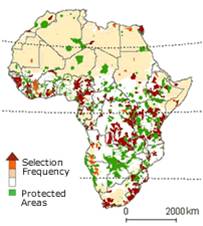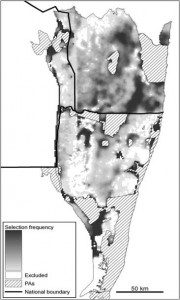
PacMARA is holding an Introduction to Marxan technical training course and a Marxan for Managers workshop in Nairobi, Kenya on 13-15 May 2013. Please feel free to send this flyer to anyone who might be interested! And please register (details below) or contact hcoleman [at] pacmara.org if you would like to attend either or both events.

– Key concepts in systematic conservation planning
– Creating planning units
– Creating the essential Marxan input files with ArcGIS
– Parameter setting in Marxan
– Understanding and using Marxan results
– Zonae Cogito (front-end software to support Marxan)
– A brief introduction to Marxan with Zones
The course time will be split between lecture (~30%) and hands-on exercises (~70%). Experience with Arc or QGIS and MS Excel are prerequisite.Participants will need to bring a laptop with ArcMap 9 or 10 (and spatial analyst), or QGIS. Please contact us if you are interested in the course but cannot bring a laptop – we may have a few available for you to use with advanced notice.
The technical course will run from 9am – 5pm both days, and costs $675 with an $80 discount for early registrants (payment of $595 completed at least 2 weeks prior to the course). Contact us for possible student discounts. Registration information is at the end of this note.

– Key approaches and tools to conservation and resource planning
– Setting targets
– Stakeholder considerations
– Cost considerations
– Planning with uncertainty
However, each workshop will be tailored to specific interests, mandates, and problems of the group.We will highlight and explain essential elements of successful planning processes, provide case studies of initiatives around the world, and lead a discussion on approaches and good practices and managerial-level experience for systematic conservation and land/water use planning. This workshop is not technical and will not involve computers.
The workshop will run from 9am – 5pm, and costs $295 with a $45 discount for early registrants (payment of $255 completed at least 2 weeks prior to the course). Contact us for possible student discounts.
Location:
Both events will be held at the African Wildlife Foundation office in Karen, Nairobi (please visit this site for a map).
To register:
When you are ready for payment through paypal, please go to this site. Please register only when you are ready to pay with a credit card or through other paypal means (unless you are paying by check or cash, in which case contact us for details).
Note that it is not necessary for you to have a paypal account (click on “Don’t have a Paypal account?” towards the bottom of the page) to complete this process.
Refund policy:
Refunds will be given within two weeks of the course start date. Cancellations less than two weeks before the course will be refunded if we can replace the participant.
About Marxan:
Marxan (Ian Ball and Hugh Possingham, 2000) is a software program used to support the design of marine and terrestrial reserves worldwide. Using Marxan, planners can identify an efficient system of conservation sites that include a suite of biodiversity targets at a minimal cost. Marxan provides a unique method for designing reserves that is systematic and repeatable. It is the most used conservation planning tool worldwide; over 60 countries, 1100 users, and 600 organizations use Marxan to support the design of terrestrial and marine reserves. For example, it has been used to help zone the Great Barrier Marine Park, design marine reserves in the Channel Islands National Marine Sanctuary, and set spatial priorities in the Romanian Carpathians to protect large carnivores.
We hope to see you soon!